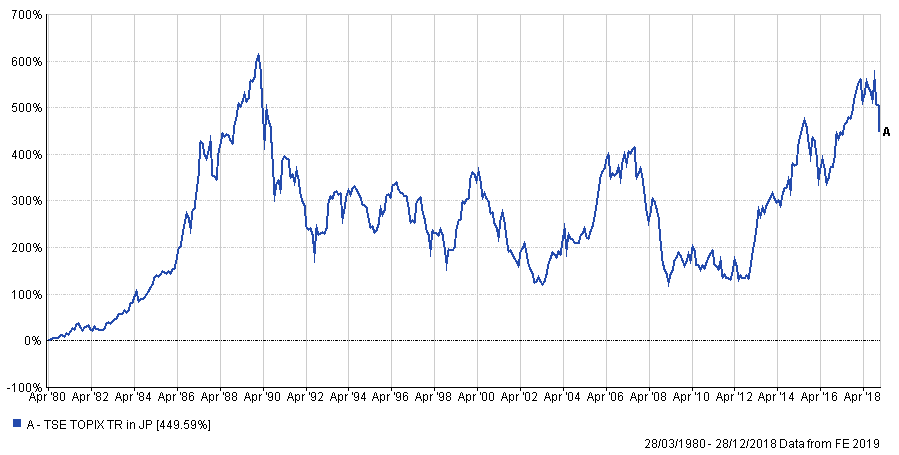
December 2018
Throughout history, financial markets have gone through bull (rising) and bear (falling) phases but in most cases tend to recover eventually so that any correction is a mere blip many years later.
For example, the 35% crash in UK equities back in 1987 is barely noticeable on a long-term chart.
But spare a thought for Japanese investors who have perhaps witnessed the deepest and most prolonged bear market in history in both equity and property markets. See Figure 1 of the Topix Index below.
Figure 1:

Source: Financial Express Analytics total return 31/12/2018 – chart is in local currency showing the experience of the domestic investors
The 1980s were a booming time for Japanese assets with the stock market increasing 600% during that decade and that exuberance extended to the property market. It has gone down in folklore that the value of the Imperial Palace in Tokyo was worth more than the whole of California. Japanese property values remain a long way below the values reached in the 1980s while the stock market is close to regaining the lost ground 30 years on, during which time most other stock markets are a long way ahead of previous peaks. It is therefore understandable why many investors, both domestic and foreign, choose to ignore Japanese equities having been scarred by past experiences.
Looking back on these episodes one can only wonder how such extreme valuations ever came to exist. But history is littered with examples of investors getting sucked into the latest ‘get rich quick’ craze, whether it be the Tulip mania in the 17th century, the dot com bubble in the late 1990s or the very recent bitcoin craze. So how can one be confident of not making a similar mistake in the future?
Among the key tenets of our investment philosophy at Hawksmoor is to ensure every investment has a sound valuation support with a margin of safety. We hope and expect this anchor will lessen the chance of us overpaying for anything and therefore reduce the risk of a permanent loss of capital. We believe that the starting valuation of any asset relative to its prospects is the key determinant of future returns and this is what is attracting us to ensure a meaningful proportion of our investors’ capital is allocated to Japanese equities at a time when many other mainstream equity markets appear expensive relative to their history and to prospective returns. But valuations alone are not sufficient to make an investment case. There are a number of other reasons why we believe Japan is on an improving trend.
Almost a third of companies in the Topix hold more than 30% of their total market capitalisation in cash, a function of management also being scarred by the bursting of the stock market bubble in 1989. They spent the following decades paying off debt and building up a cash store for a rainy day. This inevitably caused Japanese returns on equity to shrink to very low levels, which, combined with poor corporate governance giving low prominence to minority shareholders and long periods of deflation, led global investors to seek better returns elsewhere and caused domestic investors to allocate more to government bonds.
The political climate is among the most stable in Japan’s history. Prime Minister Abe, appointed in 2012, is set to be the longest serving leader since 1868 if he remains in power in 2019. His very progressive economic policy, often referred to as Abenomics, has drawn scepticism over recent years for lack of progress in achieving the stated targets of beating deflation, stimulating economic growth and implementing structural reforms. One of his first acts as Prime Minister was to appoint Governor Kuroda as head of the Bank of Japan, with the task of reflating the economy. Extraordinary loose monetary policy, including buying equities and bonds as part of its Quantitative Easing program, combined with a big fiscal stimulus seem at last to be having an effect.
According to Oldfield Partners (managers of the Overstone Global Equity Income Fund) GDP per capita has risen by 0.65% per annum over the last decade, equal to the rise in the US and ahead of the UK and France. This statistic can partly be explained by the different demographics as Japan has a much older and therefore wealthier population. Demographics in Japan has long been a negative dynamic but Abe is taking steps to turn this around. As well as providing support for women to return to the workplace, Abe is taking a controversial stance in relaxing the hitherto strict immigration rules to help ease the shortage of workers. Currently there are more than three job vacancies for every one applicant and this will only worsen as the population falls by approximately half a million a year. This dynamic is at least helping to combat deflation as wages are rising to attract quality staff as unemployment is at record lows.
Among the myriad reforms implemented, addressing the demands of shareholders for better governance and focus on returns on equity (ROE) has been high on the agenda. A relatively new equity index, the JPX Nikkei 400 Index only includes the highest ranked companies based on certain criteria including a 3-year average ROE and operating profit. This has created a catalyst for many companies to change their approach as they competed for inclusion. Dividends are now much more commonplace to the extent that the 1.5% yield available from Japanese equities is now comparable to that of American equities but crucially dividend growth should be greater from Japanese companies given their relatively low payout ratio. Share buybacks and corporate acquisitions are also more common today than before as cash is spent much more wisely. Another demonstration of corporate governance improvements has been the increased involvement of independent directors on Japanese company boards. In 2010, only 50% of listed companies had an independent director compared to 100% today.
Further, Japan is home to some of the world’s leading innovative companies specialising in high-specification technology, such as robotics, that is relevant to the new world we live in. This creates a fertile environment for active global stock-pickers. Lastly, it is an unloved area, understandably because of the history of negative returns, with international equity funds reported to be the most underweight to the region than at any time since 2002.
We are encouraged by the positive economic backdrop for the first time in many years, stability in the political environment, sustained improvements in corporate governance and valuations that seem to reflect Japan’s historic problems rather than the exciting future prospects. Consequently, we believe this progress will ultimately result in better total returns for shareholders than in many other stock markets around the world over the long-term. While every investment carries risk and in Japan’s case, a growing reliance on trade with China and the unshakable short-term correlation of the stock market performance with the direction of the Yen and global stock markets (perfectly illustrated in the last few weeks of 2018!) on balance we believe Japanese equities are worthy of a decent allocation in our Funds.
Daniel Lockyer – Senior Fund Manager

This financial promotion is issued by Hawksmoor Fund Managers which is a trading name of Hawksmoor Investment Management (“Hawksmoor”). Hawksmoor is authorised and regulated by the Financial Conduct Authority. Hawksmoor’s registered office is 2nd Floor Stratus House, Emperor Way, Exeter Business Park, Exeter, Devon EX1 3QS. Company Number: 6307442. This document does not constitute an offer or invitation to any person, nor should its content be interpreted as investment or tax advice for which you should consult your financial adviser and/or accountant. The information and opinions it contains have been compiled or arrived at from sources believed to be reliable at the time and are given in good faith, but no representation is made as to their accuracy, completeness or correctness. Any opinion expressed in this document, whether in general or both on the performance of individual securities and in a wider economic context, represents the views of Hawksmoor at the time of preparation. They are subject to change. Past performance is not a guide to future performance. The value of an investment and any income from it can fall as well as rise as a result of market and currency fluctuations. You may not get back the amount you originally invested. HA2737.
